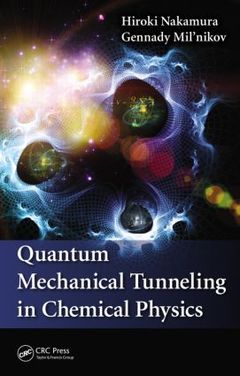Quantum Mechanical Tunneling in Chemical Physics
Auteurs : Nakamura Hiroki, Mil'nikov Gennady

Quantum mechanical tunneling plays important roles in a wide range of natural sciences, from nuclear and solid-state physics to proton transfer and chemical reactions in chemistry and biology. Responding to the need for further understanding of multidimensional tunneling, the authors have recently developed practical methods that can be applied to multidimensional systems. Quantum Mechanical Tunneling in Chemical Physics presents basic theories, as well as original ones developed by the authors. It also provides methodologies and numerical applications to real molecular systems.
The book offers information so readers can understand the basic concepts and dynamics of multidimensional tunneling phenomena and use the described methods for various molecular spectroscopy and chemical dynamics problems. The text focuses on three tunneling phenomena: (1) energy splitting, or tunneling splitting, in symmetric double well potential, (2) decay of metastable state through tunneling, and (3) tunneling effects in chemical reactions. Incorporating mathematics to explain basic theories, the text requires readers to have graduate-level math to grasp the concepts presented.
The book reviews low-dimensional theories and clarifies their insufficiency conceptually and numerically. It also examines the phenomenon of nonadiabatic tunneling, which is common in molecular systems. The book describes applications to real polyatomic molecules, such as vinyl radicals and malonaldehyde, demonstrating the high efficiency and accuracy of the method. It discusses tunneling in chemical reactions, including theories for direct evaluation of reaction rate constants for both electronically adiabatic and nonadiabatic chemical reactions. In the final chapter, the authors touch on future perspectives.
Introduction. One-Dimensional Theory. Two-Dimensional Theory. Multidimensional Effects: Peculiar Phenomena. Nonadiabatic Tunneling. Multidimensional Theory of Tunneling Splitting. Numerical Applications to Polyatomic Molecules. N-Decay of Metastable States. Tunneling in Chemical Reactions. Concluding Remarks and Future Perspectives. Appendices. Bibliography. Index.
Hiroki Nakamura, is a professor at the Institute of Molecular Science, Faculty of Science, National Chiao Tung University in Taiwan and Professor Emeritus at the Institute for Molecular Science, National Institutes of Natural Sciences in Japan.
Date de parution : 04-2013
15.6x23.4 cm
Thèmes de Quantum Mechanical Tunneling in Chemical Physics :
Mots-clés :
Instanton Trajectory; Tunneling Splitting; Quantum tunneling; Potential Energy Surface; Multidimensional theory of tunneling; Instanton Theory; Instanton; Nonadiabatic Transition; Nonadiabatic tunneling; Wave Function; Adiabatic tunneling; WKB Theory; Caustics; Hamilton Jacobi Equation; Global Potential Energy Surfaces; Classical Trajectory; Multidimensional Tunneling; Adiabatic Approximation; Potential Minimum; Nonadiabatic Chemical Reactions; Adiabatic Potential; Vibrational Excitations; Tunneling Dynamics; Ab Initio Method; Formic Acid Dimer; Tunneling Phenomena; Tunneling Path; Reaction Rate Constant; Quantum Mechanical Tunneling; Lagrange Manifold; Double Proton Transfer



